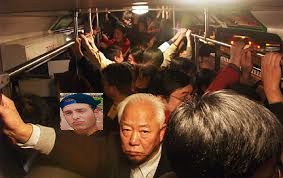5:11 PM
“Wait ‘til it fills halfway. We’ll be out of here.”
“Yeah. Half is ambitious. She’ll leave before then.”
We sat on an empty bus in the county level city of Binchuan. The bus was small—15 padded seats, crowded tight. Silence. Buses rolled in, worn out people rolled out—weary from the cramp, the incessant honking, the cigarette haze, the tired life of people who ride these buses. This is China—the one you don’t know about. The sun had ducked behind the buildings—scores of incomplete apartment blocs. Scaffolding and cranes are fixtures of any Chinese skyline. There’s new money here and a lot of people. The cities are cramped—by design. Chinese municipalities tend to religiously follow the original intention of urban life—the intention that was lost somewhere in the American fascination with cars and sprawl plus an inflated fear and stigma against public transportation. They are accessible living spaces, with friendly corner stores and loudly convivial neighborhood restaurants, steaming street food and people who appear not to harbor inexplicable resentment as they pass each other on the street. There is no need for a car. Your feet can take you most anywhere you want to go. Should you find yourself in need of traveling some distance within the city, you can take a tuk-tuk or a cab or an unmarked car without license plates. None of this will cost you more than 5 RMB. Here, even lethargy is affordable. Should you need to leave the city, say to travel to a friend’s home in the surrounding towns, you can take a bus. The bus certainly won’t cost you more than 5 RMB, and unlike in the United States, the likelihood of stepping in Bubblicious or contracting disease is negligible.
5:40 PM
“No way she fits another person on here. I can’t move my arm. Whole body is asleep.”
“Not sure. But I think I see some space in front. I feel like she could shove a medium-sized infant on top of the dashboard.”
“Yeah. Medium-sized.”
The Chinese bus system is a volume-based industry. There exists no complex algorithm relating customer satisfaction, constriction of space, or flagrant disregard for any presumed regulations with revenue. There simply does not need to be. The unambiguous profit model for a bus driver on the high mountain roads of Yunnan looks something like this. Customers • Fare = Money. C • F = $$$$. Since F is relatively stable—any increases beget a revolutionary environment—it stands to reasons that there is only one method to increasing $$$$—C. The better the driver is at increasing C—the less regard he or she has for the implications of increasing C—the more $$$$ he or she will reap. C is the variable. But, even by turducken-ing her patrons, she still can’t figure to hit the Forbes list. Think. The bus is small. Cram 35 people into it. If you get 3 RMB from each, you’re looking at 105 RMB. If you can utilize your rout to do some deliveries, you can bump that figure to 120. That’s $20 for a 40-minute ride. Give the bus company their cut and the driver is probably looking at a $7 or $8 at most. That is the maximum haul. It takes time to fill up the bus. Eight dollars for at least an hour of incredibly taxing work. It’s one of the most profitable jobs around.
Today, the driver—a terrifyingly adept businesswoman—was exerting herself to maximize C. She was a woman—rare—in her late 30s. She wore a pink sweater under a black leather vest and tight corduroys with a profusion of unnecessary zippers. Her hair was matted and curled on her forehead. A little greasy. Her expressions were vivacious, but her face betrayed a demanding forty years of life. With a busload that made the prospect of steep hills viscerally terrifying, we set off half an hour after climbing onto an empty bus. We were heading for a town halfway along the route, 20 minutes from the station.
6:01 PM
“What the hell is she doing?”
“I don’t know. Were this the US, I know we’d have Fletcher Christian’ed this shit 10 minutes ago.”
The driver was shrieking madly into the giant white cell phone at her ear. She had eased the bus into the middle of an intersection and brought it to a standstill. The conversation was essentially unintelligible. I worked out that she was coordinating some sort of meet up.
“The intersection. No! In the intersection! A bus! Oh! The corner! You’re at the corner! Why didn’t you say so! I’m in the intersection! OK!”
She cackled into the phone and once again shifted us into motion. Moments later, she rolled the bus to a stop in the middle of a heavily trafficked thoroughfare and seized her phone.
“In the street! Yes! The street! We’ll wait for you!”
A collective tension and helplessness vibed through the bus. No one said a word, though—besides the driver. She was leaning out of the driver’s side, scanning the street for her friend/acquaintance/3 RMB opportunity. I cocked my head out of the window. Our eyes met.
“What’s the deal here, lady?”
“We’re waiting. Two other people are coming. We wait here.”
I dejectedly slunk back into the bus, resolving to vociferously ‘boo’ the two people upon arrival. At this moment, an open-air truck with a four cages full of two tigers and two lions inexplicably rolled past and stopped at a stoplight. The giant, sad beasts stared at us. We shared a brief moment of commiseration. We were both miles away from home, at the mercy of lunatics. The light turned green and the cats disappeared. I saw three people walking briskly toward the bus. The driver hopped out to receive them. Two well-dressed women entered. They attempted to squeeze through the morass, eventually resigning themselves to a precarious spot on the stairs. A man with a giant white bag exchanged money with the driver. She shoved it into the trunk, which was also brimming. A few cars honked angrily and pushed past. No one raised any protest. The driver got back in and we left.
6:30 PM
“She’s out of her mind.”
She screamed wildly into the phone, no longer talking business. She appeared to be locked in intense conversation regarding her newly purchased pair of boots. She beat the horn indiscriminately. She didn’t smoke, but if she did, she would have had a cigarette in hand. Behind her sat and stood nearly 40 people, entirely unaffected, wholly unsurprised. Should the person on the other line make a particularly hysterical boot-related remark, the driver would surely lose control of the large vehicle she piloted and we would all die a very intimate death in the company of mildly irked strangers. I was happy my entire body was asleep. She stopped, and more people boarded.
6:45 PM
“Let’s get out of here.”
“Easier said.”
We arrived. I climbed over the woman sitting at my left, who, at great pains, shifted her legs to let me squeeze through. We hopped off.
I’ve had the pleasure of taking public transportation in many places. I’ve taken tiny little Combis in Lima that weave in and out of traffic like deranged froggers. I’ve been on the New Orleans streetcar, a cautionary tale of why cultural relics ought not to be expected to provide beneficial public service. I’ve ridden the subway in Tokyo, which always arrives on schedule—to the second. I took a chronically broken down overnight bus in Laos with a college friend, an 89-year-old Argentine man, and 45 teenage Christian missionaries from Seoul, relentlessly chanting bible verses in Korean. I’ve taken trains in India.
Nothing is like the Chinese transportation system. The breadth. The scope. The diversity of method. The seamlessness in which a flawlessly paved highway can become a nearly impassible avenue full of animals and boulders. The controlled chaos. China is a nation full of rules and regulations, just like any other. It’s a big country. Rules and regulations crafted in Beijing have little hope of ever being followed in the Yunnan backcountry. How could they be? No one would drive a bus limited to 15 people. They’d starve.
The real wonder of the Chinese version of people moving—as portrayed above—has little to do with rules, buses, roads, and everything to do with the movers. They are loud. They are endlessly friendly before a customer transfers money, endlessly irritable after. They are multitasking daredevils in a position that could not be more at odds with such characteristics. They are perplexingly efficient. They are virtuosos of business. They are inescapable constituents to rural Chinese life. They are maniacs.
6:46 PM
“See you next time.” The driver said, winking ominously.










